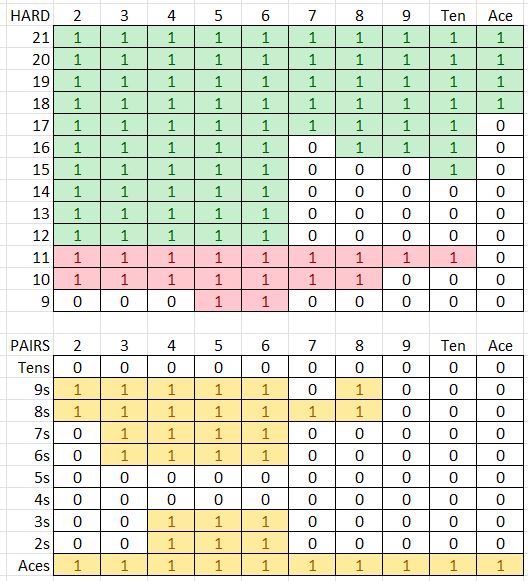I know this is a sucker game that counters can't win at, unless you cheat, see the hole card every time, the dealer accidentally flashes you the next card from 1st base, or if the cards are so worn you can get sufficient information from that (they are lazy at replacing their cards.
Cards are shuffled by machine away from the table, so no shuffle tracking.
The main reason I play there is because the environment is nice, so I goof off when it's offered.
I am convinced the house edge is approximately 7%.
My fundamental question is this:
Under this set of rules, to what extent does dealer winning all ties change the basic strategy of the game, and does it change card counting indices in any way?
I don't expect such information to be super useful: I just think it would be nice to know.
The strategy where you lose ties means you stand more often (e.g. 12v2-6; 16v8,9; 15v10) but you do hit soft 18 vs 8 (as well as the usual A9T). I also got you hit 17 vs A, but this may be because your only chance of winning with 17, similar to 16, is if the dealer busts, and that is fairly low, especially if the Dealer hasn't peeked!
Also you double less (e.g. don't double 10v9, 9v3,4).
Quote: Bowler377At my local Catholic Church, across the street from where I live, once a year they raise money by offering 2 tables of blackjack for 3 hours one night, with very low table limits of $1-$5 (you can play 2 hands if the table is slow), but with God-awful rules: 6 decks, 80% pen varies by dealer, S17, DAS, S4, blackjack pays 2:1, no insurance offered, double 9-11 only, dealer peeks, and this fundamental terrible rule: Dealer wins all ties!
I know this is a sucker game that counters can't win at, unless you cheat, see the hole card every time, the dealer accidentally flashes you the next card from 1st base, or if the cards are so worn you can get sufficient information from that (they are lazy at replacing their cards.
Cards are shuffled by machine away from the table, so no shuffle tracking.
The main reason I play there is because the environment is nice, so I goof off when it's offered.
I am convinced the house edge is approximately 7%.
My fundamental question is this:
Under this set of rules, to what extent does dealer winning all ties change the basic strategy of the game, and does it change card counting indices in any way?
I don't expect such information to be super useful: I just think it would be nice to know.
link to original post
Below is my infinite-deck strategy for hard hands and pairs in your game. (Ignore the 0s and 1s, but green = stand, red = double, and yellow = split.)
For soft hands, the only change would be to hit soft 18 vs 8.
My infinite-deck house edge is 7.13% assuming no ace re-splitting.
I didn't work on card-counting indices.

https://wizardofodds.com/games/blackjack/rule-variations/Quote: Bowler377...
My fundamental question is this:
Under this set of rules, to what extent does dealer winning all ties change the basic strategy of the game, and does it change card counting indices in any way?
I don't expect such information to be super useful: I just think it would be nice to know.
link to original post
Dealer wins all ties = -8.86% to the house.
Quote: Bowler377At my local Catholic Church, across the street from where I live, once a year they raise money by offering 2 tables of blackjack for 3 hours one night, with very low table limits of $1-$5 (you can play 2 hands if the table is slow), but with God-awful rules: 6 decks, 80% pen varies by dealer, S17, DAS, S4, blackjack pays 2:1, no insurance offered, double 9-11 only, dealer peeks, and this fundamental terrible rule: Dealer wins all ties!
link to original post
I have a feeling "blackjack pays 2-1, and dealer wins all ties" are the rules most people who don't frequent casinos / card rooms would be familiar with; those were the rules in pretty much every "house game" I have ever played.


